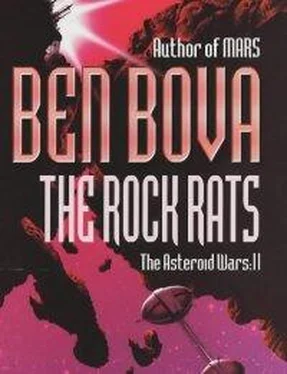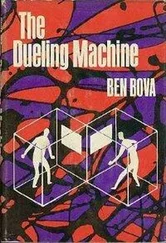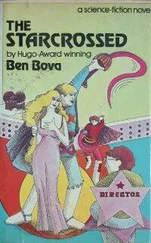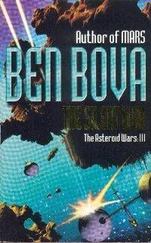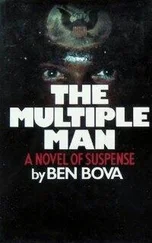Amanda had known all along that her husband would stick on this point. She had tried to keep it out of her mind, but there it was, in the open, standing between them.
“Lars,” she said slowly, picking her words with care, “whatever feelings Martin may have once had for me are long gone, I’m certain. There is no need to view this as a competition between you and he.”
He walked away from her, paced the little room in six strides and then turned back toward her, a barrel-chested bear of a man dressed in faded dark gray coveralls, his broad heavy-featured face glowering with distrust.
“But it is a competition, Amanda. Between Humphries Space Systems and Helvetia Limited. Between him and Astro, actually. We’re caught in the middle of it, whether we like it or not.”
“But we can get out of it,” she said. “You can take me back to Earth and we’ll be rid of Humphries and Astro and the rock rats for good.”
He strode to the bed and dropped to his knees before her. “I want to take you back home, dearest. I know how much you want to be away from here, how brave you’ve been to stay here with me—”
“I love you, Lars,” she said, reaching out to tousle his dark hair. “I want to be with you wherever you are.”
He sighed heavily. “Then we must remain here. At least for a little while longer.”
“But why…?”
“Because of them. The rock rats. Our neighbors and friends here on Ceres. We can’t leave them to Humphries.”
Amanda felt her eyes misting over. “We can’t let this opportunity pass us by, Lars. Please, please accept their offer.”
He started to shake his head stubbornly, but then he noticed the tears in her eyes. He got to his feet and sat heavily beside her again on the edge of the bed.
“Amanda, dearest, I can’t turn my back on all the people here. They trust me. They need me.”
“I need you, too, Lars,” Amanda said. “We’ve been out here for five years. I haven’t complained once, have I?”
“No, you haven’t,” he admitted. “You’ve been very wonderful.”
“I’m asking you now, Lars. I’m begging you. Please accept this offer and take me back home.”
He stared into her glistening eyes for long, silent moments.
She could see that he was thinking, searching for some way to do what she wanted without feeling that he had betrayed the other rock rats in the Belt.
At last he said, “Let me talk to Pancho.”
“Pancho? Why?”
“To see if Astro will make a similar offer.”
“And if they won’t?”
With obvious, painful reluctance, Fuchs said, “Then we’ll accept Humphries’s offer.”
“You will?”
He nodded, smiling sadly. “Yes, I’ll take his money and leave the Belt and bring you home to Earth.”
The name on her birth certificate read Yoshiko Takamine, but once she started at public school everyone called her Joyce. Her parents didn’t mind; they were fourth-generation Americans, with only a vague feeling of nostalgia for the family’s roots in Japan. The first time one of her schoolmates called her a “Jap,” Joyce thought she meant “Jewish American Princess. ”
Father moved them to the hills above Sausalito, but when the greenhouse floods wiped out most of the electrical power generation plants in the Bay area, they were plunged into darkness along with everyone else. Those were desperate times, with half the county thrown out of their jobs. No electricity, no work. Joyce’s class held their senior prom by candlelight, and there was talk of bringing in drilling companies to bore wells deep enough to tap the natural gas that lay kilometers below-ground.
All the kids had to find some kind of job to help support the family. Joyce did what her great-grandmother had done more than a century earlier: migrant stoop labor in the farms down in the rich valleys of California. The floods hadn’t reached that far inland, although prolonged drought was searing the orchards and vineyards mercilessly. It was hard, bitter work, picking fruits and vegetables beneath the hot sun while grim-faced men armed with shotguns kept on patrol against wandering bands of starving looters. They expected casual sex from the workers. Joyce quickly learned that it was better to please them than to go hungry.
When Joyce returned home that winter, she was shocked to see how much her parents had aged. An epidemic of dengue fever had swept the coast and even reached into the hills where they lived. Her mother sobbed softly at night; her father stared into the hot cloudless sky, racked with bouts of coughing that left him gasping for breath. When he looked at his daughter he seemed ashamed, as if all this devastation, all this ruination of the family’s plans, was his fault alone.
“I wanted you to become an engineer,” he told Joyce. “I wanted you to rise beyond my station in life.”
“I will, Dad,” she told him, with the careless assurance of youth. And when she turned her eyes to the sky, she thought about the wild frontier out along the Asteroid Belt.
“He’s put in a call to Pancho Lane,” said Diane Verwoerd.
She and Humphries were strolling through the courtyard outside his mansion. Humphries claimed he enjoyed taking a walk in the “outdoors”—or as near to outdoors as you could get on the Moon. Humphries’s home was in the middle of a huge grotto down at the deepest level of Selene’s network of underground corridors and habitation spaces. The big, high-ceilinged cavern was filled with flowered shrubbery, profusions of reds and yellows and delicate lilacs blooming from one rough-hewn rock wall to the other. Taller trees rose among the profusion of flowers: alders and sturdy maples and lushly flowering white and pink gardenias. No breeze swayed those trees; no birds sang in the greenery; no insects buzzed. It was a huge, elaborate hothouse, maintained by human hands. Hanging from the raw rock ceiling were strips of full-spectrum lamps to imitate sunlight.
Verwoerd could see the enormous garden beyond the ornate fountain that splashed noisily in the courtyard. The house itself was massive, only two stories high, but wide, almost sprawling. Built of smoothed lunar stone, its roof slanted down to big sweeping windows.
Compared to the gray underground drabness of the rest of Selene, this garden and home were like a paradise in the midst of a cold, forbidding desert. Verwoerd’s own quarters, several levels up from this grotto, were among the best in Selene, but they seemed cramped and colorless compared to this.
Humphries claimed he enjoyed walking in the open air. The only other open space in Selene was the Grand Plaza, under the big dome up on the surface, and anyone could take a stroll up there. Here he had his privacy, and all the heady color that human ingenuity and hard work could provide on the Moon. Verwoerd thought he enjoyed the idea that all this was his more than any aesthetic or health benefits he could gain from walking among the roses and peonies.
But any pleasure he might have enjoyed from this stroll was wiped away by her announcement.
“He’s called Pancho?” Humphries snapped, immediately nettled. “What for?”
“She scrambled his message and her reply, so we don’t know the exact words as yet. I have a cryptologist working on it.”
“Only one message?”
With a small nod, Verwoerd answered, “His incoming to her, and hers outgoing to him immediately after.”
“H’mm.”
“I can guess what the subject was.”
“So can I,” Humphries said sourly. “He wants to see if she’ll better our offer.”
“Yes.”
Читать дальше
